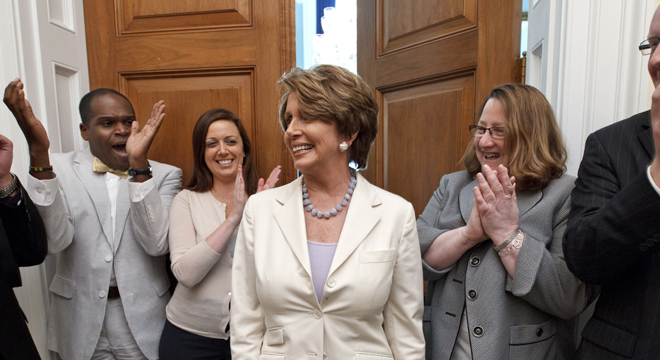Whether there’s an immigration reform bill or not depends to a large degree on how House Speaker John Boehner (R-OH) chooses to run the House. But if there is going to be an immigration reform bill, it won’t be Boehner’s show alone.
As Boehner effectively acknowledged Thursday, passing legislation that could conceivably become consensus comprehensive immigration reform will require both Democratic and Republican votes. And that means Minority Leader Nancy Pelosi (D-CA) will have tremendous sway over what the House produces.
But for now Pelosi’s being cautious with that power. Though she’s urged Republicans to pass a single, bipartisan comprehensive immigration reform bill, and to move with deliberate haste, she’s stopped short of nixing the process the GOP has chosen to move immigration legislation and is even tolerant of the rhetorical games Republicans are playing as they try to cobble together a majority for provisions dealing with the 11 million immigrants currently in the country illegally.
And she won’t go anywhere close — yet — to introducing what’s known as a “discharge petition” — which, with 218 signatures, would force a House vote on the Senate’s comprehensive bill.
“I fully subscribe to the idea that we should have a House bill … we shouldn’t have to just accept the Senate bill,” Pelosi told TPM in a wide-ranging interview Wednesday. “However, there is a Senate bill. And that gives leverage to those who say ‘now pass something in the House. Pass something and go to conference.’ If you don’t, there will be strong public sentiment, to take up, give us a vote, on the Senate bill.”
If we reach that point in the weeks and months ahead, Pelosi will probably step up the pressure and take procedural steps to secure — or attempt to secure — a vote on the Senate bill. But we’re not there yet. There’s political value in allowing the GOP to try to sort this out among themselves. Furthermore, skipping steps and going straight to hardball probably diminishes the chances her actions would be successful. And so Pelosi won’t even entertain hypothetical scenarios about the consequences if the House GOP can’t ultimately pass anything.
“I’m more optimistic than you are about this,” she added. “I really do believe that we shouldn’t be saying if you don’t do this we’re going to be doing that.”
But she does acknowledge that Boehner will run into problems moving piecemeal immigration bills if he adheres to the criterion that immigration reform legislation must have the support of more than half of his conference.
“I don’t even know if they can pass those on the floor though,” Pelosi added. “I don’t even know if they can pass those bills though. So at some point they’re going to have to have a bipartisan vote on whatever they send forward.”
Pelosi is similarly sanguine about a different congressional imperative — replacing Section 4 of the Voting Rights Act, which the Supreme Court struck down last month.
“We had meetings immediately after the Supreme Court decision,” she said. “People have been tasked to do different things in a bipartisan way. The Judiciary Committee will have a hearing next week. … It’s about timing. We really have to do it this year. We can have hearings. We can do this, we can do that. But it should be done in a way that accomplishes all of it this year, because you see states are already using this interim period to make mischief.”
You’d think that urgency might prompt her to tout the procedural and messaging power of a discharge petition. But as with immigration reform, there are political reasons to let the GOP try to get its act together on its own first.
“[Voting Rights Act reauthorization] was very strongly bipartisan,” Pelosi said. “So it wasn’t as if it eked its way through and now they’re going to get even. It was very bipartisan. We believe it will continue to be.”










